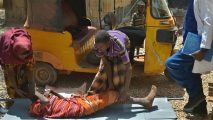Privacy Overview
This website uses cookies so that we can provide you with the best user experience possible. Cookie information is stored in your browser and performs functions such as recognising you when you return to our website and helping our team to understand which sections of the website you find most interesting and useful.


















17, April 2020
The mystery of Cameroon’s unusually absent president: ‘Sir, are you alive?’ 0
Maybe he was at home. Maybe he was at his favorite Swiss hotel.
It had been 35 days since anyone saw the president of Cameroon — or, at least, since anyone had revealed his whereabouts — and people in the central African country had questions.
“Sir, are you alive?” one man asked on Twitter.
The public absence of Paul Biya — who, at 87, is the oldest leader in Africa — during the coronavirus pandemic fueled outrage, concern and wild theories before the strongman turned up Thursday in a photo with the French ambassador to Cameroon.
“On the menu for our exchange this afternoon: managing the COVID-19 pandemic in Cameroon, France and around the world,” Biya tweeted.
“You have risen?” someone wrote in response.
“We don’t ask you to receive people,” another said. “We ask you to address the nation.”
The photo surfaced one day after Maurice Kamto, the president’s chief political rival, called on Cameroon’s legislature to declare a power vacancy and hold a new election.
The prominent politician, who challenged Biya in the 2018 race, cited the country’s constitution, which dictates that voting must begin within 40 days of a president’s death, resignation or “permanent incapacity.”
“Cameroonians are expecting him to address the nation, to tell them exactly what is going on, to share his vision,” Kamto told The Washington Post. “Whether that photo is real? Authentic? I don’t know.”
Christophe Guilhou, the French ambassador, retweeted the image, which showed the men sitting on separate cream couches.
Neither he nor Biya’s office responded to requests for comment.
Photoshop scandals involving the president have damaged trust in the past, said Doris Toyou, a Cameroonian lawyer in New York.
An obviously manipulated photo of Biya at a funeral for fallen soldiers appeared on the presidential website in 2015. (He was in Europe, not at the event.)
“The photo was illegally modified by someone who managed to hack into the site,” the communications minister told France 24 at the time.
People want more than evidence of a meeting with the French ambassador, Toyou said.
“The question remains the same,” she said. “Is he able and willing to perform presidential function?”
Citizens had been wondering: Is Biya’s hand really signing those presidential decrees? Who is actually behind his Facebook posts?
On social media, Cameroonians demanded to hear him speak about the growing outbreak on their soil. The nation has recorded 848 cases and 14 deaths. The airports are closed. Schools and places of worship have shuttered.
Biya’s ministers have done the talking since the first case emerged on March 6. The top health official tweets daily updates in English and French.
The silence is a stark contrast to other presidential approaches to covid-19.
The Senegalese leader has released a video of himself washing his hands. The Ugandan president posted footage of his indoor workout. The Guinean ruler gave a speech with face masks shielding his microphones.
British Prime Minister Boris Johnson, who spent a week in intensive care with a severe case of the virus, allowed cameras to film him this month in a hospital bed.
“During this pandemic, every single country in the world needs to hear from their head of state,” said Kamto, the Cameroonian opposition leader.
The chances of Cameroon declaring a power vacancy are slim to none. The National Assembly and the Constitutional Council, which handle such matters, are crowded with members of Biya’s party.
They’ve defended him over the decades — Biya took office in 1982 — through allegations of military brutality, rigged elections and an extraordinary amount of time spent on private trips abroad — even as a separatist uprising and Boko Haram attacks have rocked the country.
Biya spent a third of his time overseas in 2006 and 2009, according to one widely shared report from the Organized Crime and Corruption Reporting Project, an international group of investigative journalists.
During some of his stays in Switzerland, Cameroonians in the country protested outside his preferred hotel: the InterContinental Geneva.
Has he been there lately?
“I do not have any information,” a receptionist told The Washington Post before hanging up.
Biya is known for taking long breaks away from the public eye, said Jeff Smith, the founding director of Vanguard Africa, a pro-democracy nonprofit organization.
“It’s not an uncommon refrain to hear Cameroonians lament the fact that they have a ‘ghost president,’ ” he said.
However, Smith added, “his absence is really quite shocking during a time in which Cameroon has experienced the most cases and deaths due to the coronavirus in all of Central Africa.”
Culled from The Washington Post